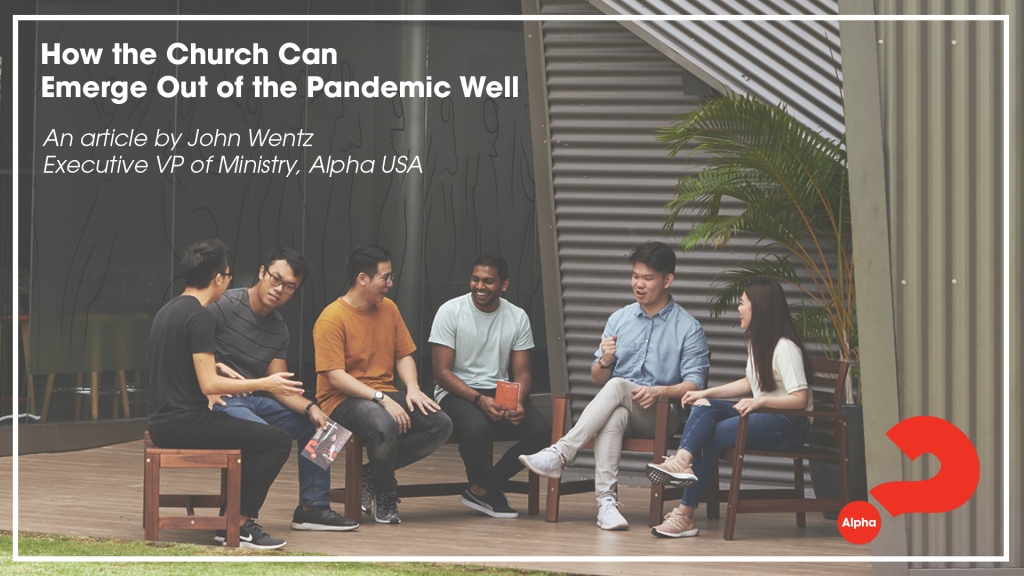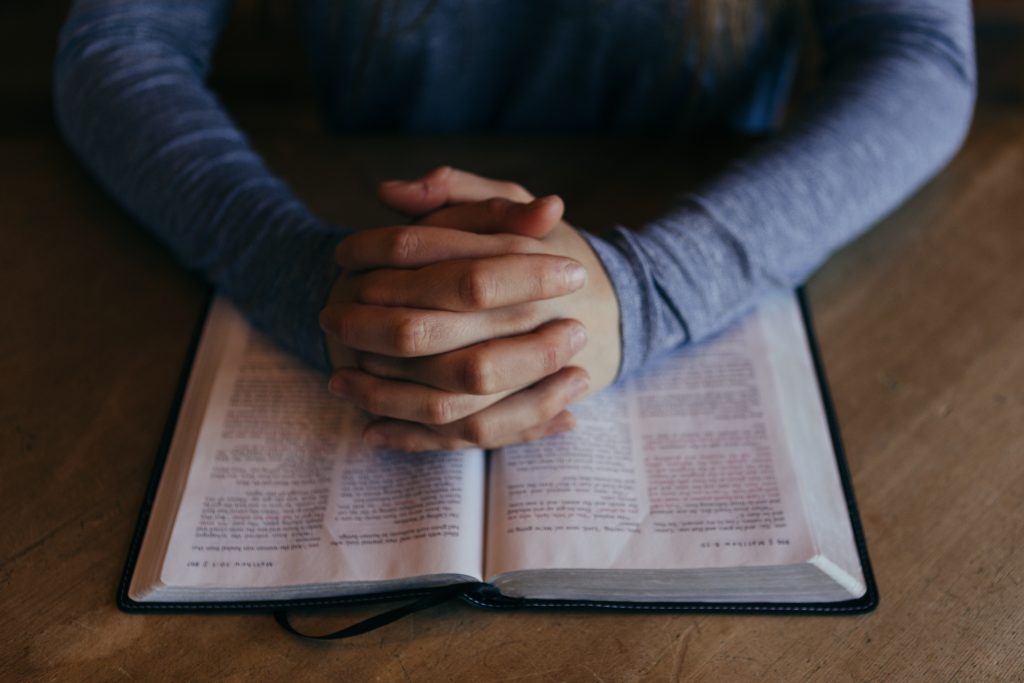This article was written by John Wentz, Executive VP of Ministry of Alpha USA and first published on the Alpha USA blog. Find the original article here.

As life restabilizes for most of our country, many are asking questions about where we go from here. How do we re-engage as a society? How do we take the lessons and skills of the past year and a half, and move forward with grace and purpose? How do we make the most of the opportunity before us before this particular window closes?
Our world is hurting. The collective grief, trauma, and fear of the past year require acknowledgment and recovery work. But where there is pain, there is opportunity for healing as well. Where we have been torn down, there is an opportunity to rebuild stronger, more united, and more Spirit-filled.
This healing work, this rebuilding, is fueled and sustained by a posture of humble prayer.
If 2020 taught us anything, it is that we are not in control. Our plans are dust. We cannot make anything of lasting kingdom value happen (or not happen) by willpower alone. As Jesus said, we can do nothing apart from him. (John 15:5)
With so many of us newly aware of our inability to see the way forward, we have an opportunity to rally together and pray. One thing is clear; the world is transitioning and many people are questioning their values, changing/losing jobs, relocating and questioning life altogether.
What if we were to meet this global season of transition with a great uprising of fervent prayer and fasting?
What if thousands of intercessors began to fast for extended 20-, 30-, or 40-day fasts for vitality of the Church and for a renewed focus on the kingdom of God in all its goodness and kindness and gentleness? The seriousness of the global moment requires a deep commitment to seeking God’s kingdom above all things.
Let us stop working in our own strength. Let us fall to our knees and ask God to work, God to change hearts, God to bring healing through us to the walking bruised and weary of our world.
But the opportunity of 2021 doesn’t stop with “prayer and hope,” it merely starts there.
We must be the hands and feet of Jesus in action.
The prayer of St. Francis can be a guide for us here:
“Lord make Me an instrument of Your peace.
Where there is hatred let me sow love.
Where there is injury, pardon.
Where there is doubt, faith.
Where there is despair, hope.
Where there is darkness, light.
Where there is sadness, joy.”
But how do we do this? How do we become instruments of peace?
Perhaps we can find a hint in the 2020 Barna Group study, which suggests that 62% of non-Christians and lapsed Christians say that the top quality they would look for when it comes to talking with someone about faith is someone who listens without judgment. The second thing they look for is someone who doesn’t force or pressure them to draw a conclusion.
Listening. Without judgment. Leaving space for the Spirit to work. Without pressure.
These are the things Alpha is all about. We desire to create a safe space where anyone from any background can ask questions without fear of judgment; where they can explore faith without being forced to form fast opinions, where they can connect with others and experience God’s Spirit for themselves.
Isn’t that exactly what the world is hungry for right now? People are longing to be seen and heard. As author and pastor, Mark Sayers writes in his book, Reappearing Church, “Crisis precedes renewal.”
What if our renewal included a return to prayer with renewed vigor, along with a commitment to love the stranger; to meet people where they are and offer them what they long for—an ear to hear, a shoulder to cry on, a friend to walk beside them?
When we started providing Alpha Online we thought we were meeting a need specific to the pandemic—and we were. But we learned that there are many on the margins who wouldn’t be comfortable at an in-person Alpha, or who wouldn’t be able to come at all.
- The single working mom, who has no options for childcare.
- The cancer patient whose immune system is compromised and can’t be in large groups.
- The grandma with MS who struggles to get around.
- The middle-aged man with crippling anxiety and OCD who fears leaving his house.
- The teenager who doesn’t have a car and spends most of his time at home, alone, online.
Alpha Online has paved a way for these people to interact with others and learn how much Jesus loves them. It’s opening doors we didn’t even realize were shut and locked.
Now as the opportunity to meet in person is available, let’s take that pandemic spirit of resourcefulness back into our familiar spaces. As we return to semi-familiar rhythms, let’s posture ourselves to listen and love everyone in our community.
Who else can we reach who we haven’t reached before? How can we connect with others who wouldn’t typically have an opportunity to hear about or experience the love of Jesus?
These questions hold exciting opportunities for those who are willing to creatively adapt.
We witnessed this sort of creative adaptation when churches came together during the pandemic to support each other during a challenging year. Those with technical skills helped their neighbors without. Communities combined services and pooled resources when needed.
Our country may have become more polarized, but the need for supporting and listening to one another could not be more urgent. There’s an opportunity here for us to continue to hold each other up, to build foundations of mutual respect between different expressions of the body of Christ.
Moving forward, how can we continue to look out for each other? How can we work together to support and serve one another in love, as fellow members of God’s family? How can we share and collaborate?
Our world is full of division, competition, and exclusion. But not so with the kingdom of God! Here and now, we have an opportunity to show the world something different, something holy.
“By this everyone will know that you are my disciples if you love one another.” (John 13:35)
In the last year and a half, the entire world has experienced a common global crisis together. Rarely in human history has every region of the world experienced the same trauma together. In the midst of that, we’ve witnessed hopeless indifference, exhausted moral failures, and aggressive attacks on our ability to love each other. However, we have also witnessed love and collaboration in the midst of a crisis. Now, we have an opportunity to continue that work and extend love in the midst of our new ordinary.
This is how the Church can emerge from the pandemic well—
stronger by listening; stronger by love;
our love for one another.
our love for other expressions of the body of Christ.
our love for the stranger outside our walls, those who don’t know or claim Jesus’ name.
our love for the marginalized, the hurting, the wounded, the lost.
We love because God first loved us.
This is the nature of the kingdom of God.
There’s an opportunity here for us to continue to hold each other up, to build foundations of mutual respect between different expressions of the body of Christ.
John Wentz









